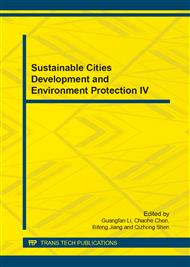[1]
Daolin Zhu, Sichao Xu, Study on the relationship among housing demand, land supply and housing supply based on urban population growth, China Land Sciences , vol. 27, No. 11, Nov, 2013, pp.45-51.
Google Scholar
[2]
Yu Kong, Feng Wei, Hong Ren, Macroeconomic factors affecting city housing prices, Statistics and Policy-making, No. 10 ( General No. 223 ), 2006, pp.84-85.
Google Scholar
[3]
Yuhuan Sun, Xiaoyan Ma, Analysis of the market internal driving factors of the commercial housing demand and prices,. Statistics and Policy-making, No. 17(General No. 269), 2008, pp.97-99.
Google Scholar
[4]
Dong Yang, Shukuan Zhao, Elastic changes in China's commercial housing demand in recent ten years, Social Science, April, 2013, pp.27-31.
Google Scholar
[5]
Huafei Chen,Xiulan Wang, Study on equilibrium between supply and demand in housing market—a case of Wuhan City, China Land Science, vol. 22, No. 10, Oct., 2008, pp.17-23.
Google Scholar
[6]
Jijiang Han, Study on housing demand subdivision and market equilibrium, Price Research Monthly, General No. 403, Dec., 2010, pp.80-85.
Google Scholar
[7]
Kaibin Chen, Fan Xu, Li Tan, Demographic changes and housing demand in China: 1999-2025 – micro empirical research based on census data, No. 1, 2012, General No. 379, pp.129-140.
Google Scholar
[8]
Leiwen Jiang, Qiang Ren, The projection of population, households and housing demand in China, Market & Demographic Analysis, vol. 11, No. 2, 2005, pp.20-29.
Google Scholar
[9]
Qiao Yang, Housing market demand analysis based on the result of China's sixth census, Macroeconomic Research, No. 4, 2013, pp.39-43.
Google Scholar
[10]
Zhizhuang Zou, Linlin Niu, Urban residents' housing demand and supply in China, Financial Research, No. 1, 2010, pp.1-11.
Google Scholar
[11]
Tao Hong, Yuchao Jing, Determinants of housing affordability based on regional differences in China, Journal of TIT, vol. 16, No. 1, Feb, 2014, pp.35-41.
Google Scholar
[12]
Guoqing Liu, Honglei Wang, Application of BP neural network and genetic algorithm in the public company credit rating, Economic Research, No. 12, 2009, pp.77-80.
Google Scholar
[13]
Haiyan Chen, Sijing Cai, Minggui Zheng, Evaluation of China's Sustainable development of energy based on GA-BP model, ACTA ENERGIAE SOLARIS, Sep. , 2010, pp.1221-1224.
Google Scholar
[14]
Yi Zheng, Shuai Lin, Application of genetic neural network in the evaluation of commercial bank credit risk, Social Scientist, No. 1, General No. 129, 2008, pp.133-135.
Google Scholar
[15]
Xiaochun Wang, Feng Shi, Lei Yu, Yang Li, 43 case studies of matlab neural network, Beijing University of Aeronautics and Astronautics Press, pp.2-5.
Google Scholar


